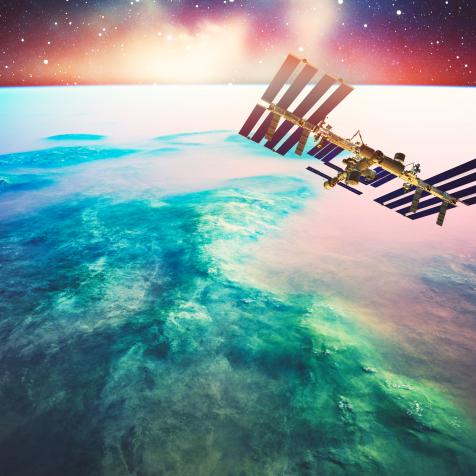
c/o Mike Massimino
Do You Want to Go to Space?
Have you always dreamed of going to space? Former NASA astronaut Mike Massimino answers our questions about life at the International Space Station.
You Could Go to Space (Yes, Really YOU!)
When you look up at the stars, do you dream of space travel?
Discovery’s new series, WHO WANTS TO BE AN ASTRONAUT is giving regular people the chance to compete for an official spot aboard a rocket to outer space. The winner will get to live at the International Space Station (ISS) for eight days.
We caught up with former NASA astronaut and mechanical engineer, Mike Massimino, to ask him about life aboard the ISS, and tips for aspiring astronauts.
Mike, the first person to tweet from space and a recurring character on The Big Bang Theory, grew up in a working class family with dreams of one day becoming an astronaut. Mike says it was his hard work and determination that helped him achieve his goals. Now, two missions to the Hubble Telescope and four spacewalks later, he shares his insights on what makes the opportunity to go to space so unique.
Why should people be excited about the opportunity to go into space?
Mike: Going to space is a life changing experience. It can give you a perspective on the beauty and fragility of our planet that can only be obtained from looking at our planet from orbit. It can also provide the opportunity to make significant contributions to the world through scientific research, educational outreach, and raising awareness for global initiatives such as protecting our environment.
What is your best memory from space?
Mike: Viewing the Earth from orbit, losing myself in the beauty of our home — I felt like I was looking at an absolute paradise.
What skills do you think would be most valuable to applicants?
Mike: Being a team player, having a purpose for going to space, and being curious.
What can people expect from a two-week stay at the ISS?
Mike: The absolute adventure of a lifetime– floating, viewing the beauty of Earth and the universe around us, making lifelong friendships, and doing meaningful work.
What were your sleeping accommodations?
Mike: On the space shuttle, it was like a slumber party every night. We took out our bedrolls and attached them to a part of the cabin (I chose the ceiling– how often can you sleep on the ceiling?), and then floated inside. On ISS most crew members have sleep stations, which are like a closet, but nice and cozy.
What's the bathroom situation?
Mike: On the space shuttle, we all shared one toilet. We urinated into a hose and the urine was collected in a tank and then dumped into space. We pooped into a toilet (not a flush toilet– no water) and the poop was compacted every few days and the system serviced when we returned to Earth. On ISS the urine is collected, cleaned, and recycled to be re-used as clean drinking water– As my astronaut friend Don Pettit says– today’s coffee is tomorrow’s coffee. For pooping on ISS, there is basically a can with a toilet seat on top and a plastic liner (a new liner is used for each event). When full, the can is capped and placed into an emptied cargo ship that becomes a garbage dumpster to burn up during re-entry.
Diary of an Astronaut: Mike Massimino 9 Photos
Go inside NASA Astronaut Mike Massimino's dedication to space exploration.Could a journey much like Mike's be in your future and share your mission with the world? Apply to be a part of the new Discovery show WHO WANTS TO BE AN ASTRONAUT?
Ready for a Once in a Lifetime Adventure?
For a chance to become a space traveler just like Mike, APPLY HERE.



















